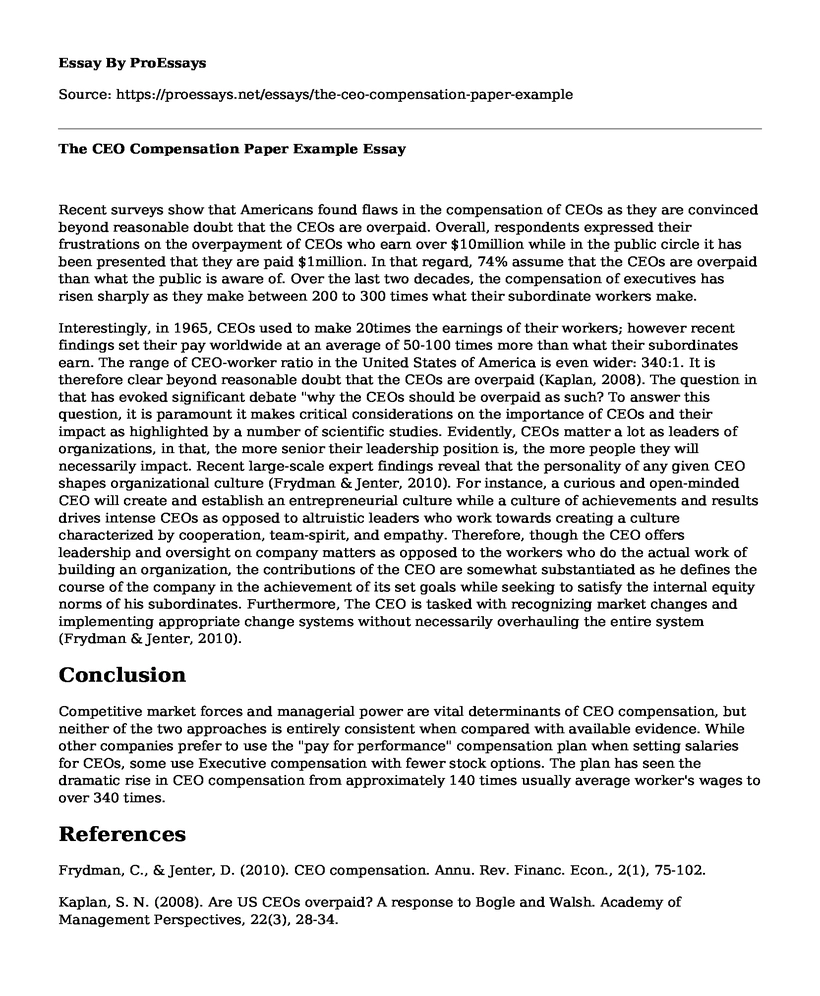Recent surveys show that Americans found flaws in the compensation of CEOs as they are convinced beyond reasonable doubt that the CEOs are overpaid. Overall, respondents expressed their frustrations on the overpayment of CEOs who earn over $10million while in the public circle it has been presented that they are paid $1million. In that regard, 74% assume that the CEOs are overpaid than what the public is aware of. Over the last two decades, the compensation of executives has risen sharply as they make between 200 to 300 times what their subordinate workers make.
Interestingly, in 1965, CEOs used to make 20times the earnings of their workers; however recent findings set their pay worldwide at an average of 50-100 times more than what their subordinates earn. The range of CEO-worker ratio in the United States of America is even wider: 340:1. It is therefore clear beyond reasonable doubt that the CEOs are overpaid (Kaplan, 2008). The question in that has evoked significant debate "why the CEOs should be overpaid as such? To answer this question, it is paramount it makes critical considerations on the importance of CEOs and their impact as highlighted by a number of scientific studies. Evidently, CEOs matter a lot as leaders of organizations, in that, the more senior their leadership position is, the more people they will necessarily impact. Recent large-scale expert findings reveal that the personality of any given CEO shapes organizational culture (Frydman & Jenter, 2010). For instance, a curious and open-minded CEO will create and establish an entrepreneurial culture while a culture of achievements and results drives intense CEOs as opposed to altruistic leaders who work towards creating a culture characterized by cooperation, team-spirit, and empathy. Therefore, though the CEO offers leadership and oversight on company matters as opposed to the workers who do the actual work of building an organization, the contributions of the CEO are somewhat substantiated as he defines the course of the company in the achievement of its set goals while seeking to satisfy the internal equity norms of his subordinates. Furthermore, The CEO is tasked with recognizing market changes and implementing appropriate change systems without necessarily overhauling the entire system (Frydman & Jenter, 2010).
Conclusion
Competitive market forces and managerial power are vital determinants of CEO compensation, but neither of the two approaches is entirely consistent when compared with available evidence. While other companies prefer to use the "pay for performance" compensation plan when setting salaries for CEOs, some use Executive compensation with fewer stock options. The plan has seen the dramatic rise in CEO compensation from approximately 140 times usually average worker's wages to over 340 times.
References
Frydman, C., & Jenter, D. (2010). CEO compensation. Annu. Rev. Financ. Econ., 2(1), 75-102.
Kaplan, S. N. (2008). Are US CEOs overpaid? A response to Bogle and Walsh. Academy of Management Perspectives, 22(3), 28-34.
Cite this page
The CEO Compensation Paper Example. (2022, Sep 05). Retrieved from https://proessays.net/essays/the-ceo-compensation-paper-example
If you are the original author of this essay and no longer wish to have it published on the ProEssays website, please click below to request its removal:
- Appraising Performance at Precision - Course Work on HR Management
- A Report on Change Requirements for Fast Tack
- Essay Sample on Self-Managed Teams
- Personal and Professional Skills Required to Achieve Amazon Strategic Goals
- Essay Sample on Gibbs Reflection About the Job Interview
- Consumer Decision-Making: A Comprehensive Review of Perceptions of Retailers' Marketing Practices - Essay Sample
- Essay Sample on Workaholism in College: How to Avoid its Lasting Effects







